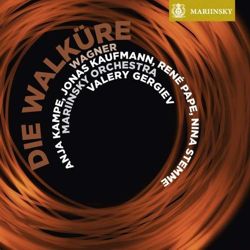|
|
|
|
|
|
|
|
|
Gramophone, May 2013 |
| Mike Ashman |
|
|
|
Gergiev's new in-concert Ring launches with Die Walküre |
|
| |
 This
new set, the first of a planned Ring that is being assembled from live
concert performances, boasts a promising line-up. Pape sings beautifully —
one might add 'of course' —and he is a bass, Wagner's intended voice for the
role. But Pape is also rather cautious about taking risks, both with finding
appropriate colours for the text and adding just that extra lick of tension
(aka 'going for it') which would make his war-father the dramatic equal of,
say, Sir John Tomlinson's. The Act 2 monologue is most sensitively managed
from a dynamic point of view — by Gergiev too — and is often, rightly, very
quiet. But it remains intimately Lieder-like and (too?) beautifully sung
even in the great outbursts of bitterness at 'Nimm' mein Segen' and 'Das
Ende' — the latter unforgettable from both Hans Hotter and Tomlinson but
here just a statement of fact. In Act 3, too, Pape seems obsessed with
remaining noble; he never sounds angry with his daughter or bitter at his
loss of control. This
new set, the first of a planned Ring that is being assembled from live
concert performances, boasts a promising line-up. Pape sings beautifully —
one might add 'of course' —and he is a bass, Wagner's intended voice for the
role. But Pape is also rather cautious about taking risks, both with finding
appropriate colours for the text and adding just that extra lick of tension
(aka 'going for it') which would make his war-father the dramatic equal of,
say, Sir John Tomlinson's. The Act 2 monologue is most sensitively managed
from a dynamic point of view — by Gergiev too — and is often, rightly, very
quiet. But it remains intimately Lieder-like and (too?) beautifully sung
even in the great outbursts of bitterness at 'Nimm' mein Segen' and 'Das
Ende' — the latter unforgettable from both Hans Hotter and Tomlinson but
here just a statement of fact. In Act 3, too, Pape seems obsessed with
remaining noble; he never sounds angry with his daughter or bitter at his
loss of control.
Stemme has the measure of her role in spades and her
strong, pure, just slightly chilled tones (a description, not a criticism)
deliver memorably the great curve of Act 3 — fear, defiance, guilt, more
defiance to almost flirtation. Act 2 is also precisely given, especially the
Todesverkündigung, but she is not best served in the scenes with Wotan by
Gergiev's enigmatically laid-back approach. Act 1 goes well from all
three participants, Kaufmann making his voice distinctively other (older,
darker) than his Lohengrin. Again, though, Gergiev pulls back in
the middle of things, here in Kampe's delivery of her life-so-far monologue,
which doesn't explode into the entry of spring and the lovers' declarations
as it might. Gubanova is a lively, probing Fricka and the Valkyries a
well-saddled bunch.
The still decidedly un-Western sound of Gergiev
and his orchestra is a dramatic advantage to this opera's tense underlay.
The act timings, incidentally, are almost identical to those of Karajan's DG
recording. Here their evident command and enjoyment of the piece are
slightly compromised, either by their maestro's occasional holding back or
the difficulty of maintaining a dramatic line over three very distant
recording periods from June 2011 to April 2012. Was much added from outside
the concert performances? Sound and balance are excellent.
Collectors will relish Stemme and Kaufmann but this first instalment is not
a major challenge to old favourites such as Krauss or Barenboim.
|
|
|
|
|
|
|
|
|
|
|
|
|
|
|
|
|
|
|